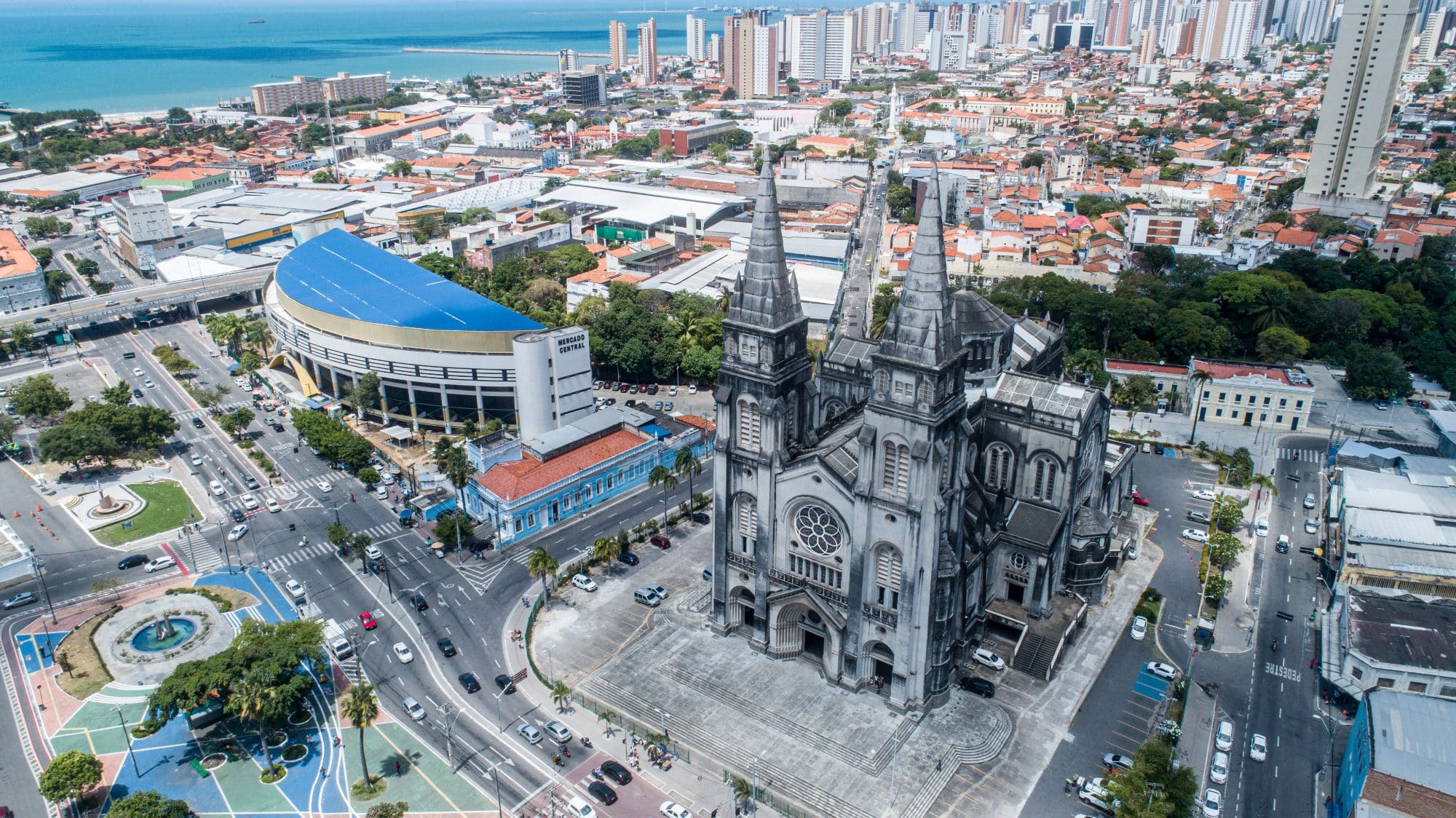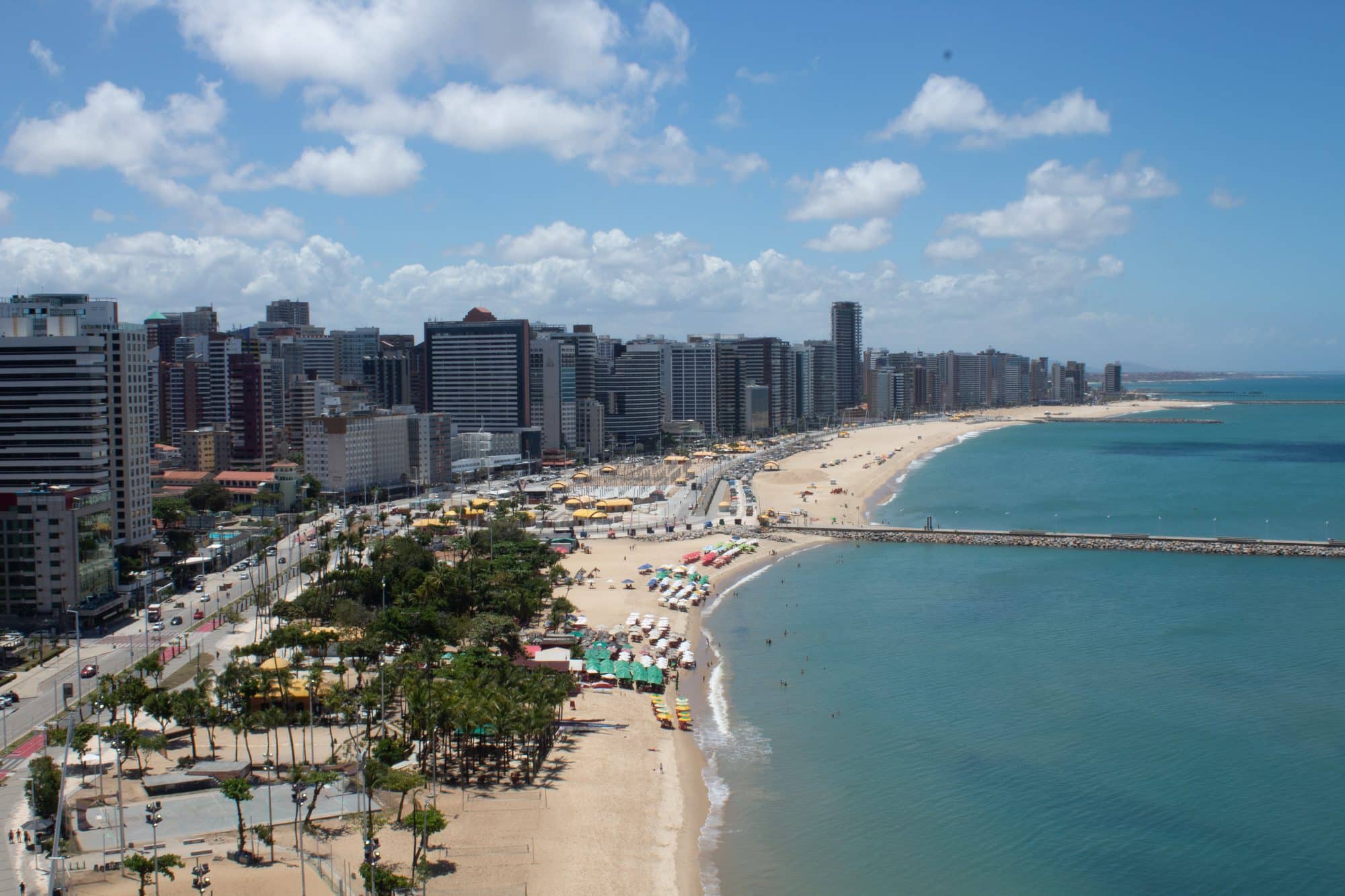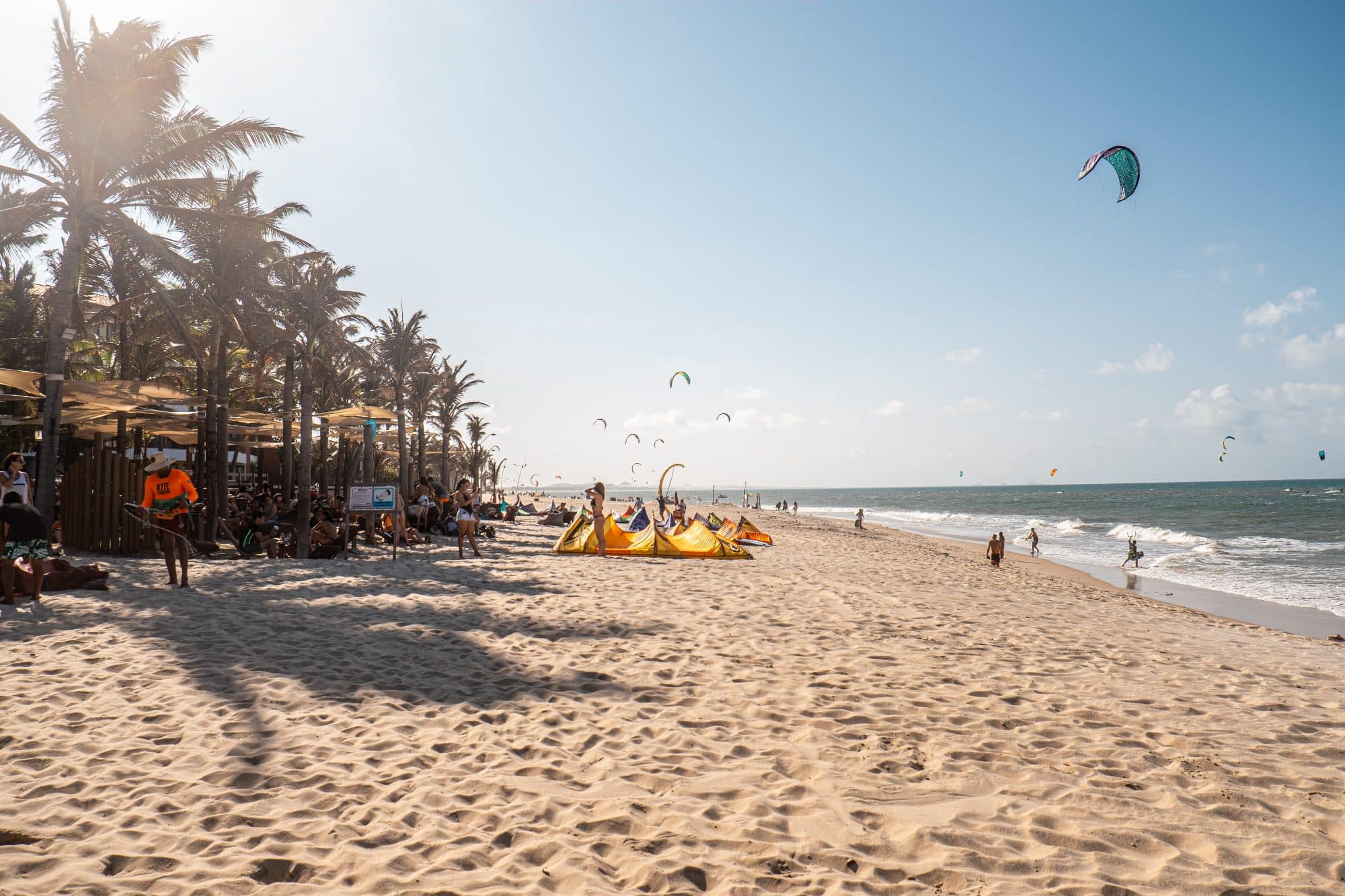Welcome to Fortaleza, the coastal gem of Brazil and arguably one of the best places to retire in the entire country and even in Latin America. In this guide, we explore expat life in Fortaleza, uncovering what makes the city a great expat destination and examining any potential downsides.
Highlights:
- Location: in Northeast Brazil, on the Atlantic coast.
- Climate: a tropical climate with warm temperatures year-round, with a rainy season from February to May and a dry season from June to January.
- Population: about 2.7 million people, one of the largest cities in Brazil.
Secure Peace of Mind with Best-Value International Health Coverage
International Citizens Insurance provide free, no-obligation quotes from the leading international health insurance providers with plans tailored to meet your needs. Trusted by thousands of expats worldwide.
Fortaleza at a glance
If you are afer an urban lifestyle on a beachfront, Fortaleza is the right kind of place for you.

It is a lively seaside city with a great cultural and nightlife scene. All the facilities you need are here. Entertainment is in abundance - there are movies, plays, shows, and entertainment venues, and always something fun to do.
Despite its sprawling population of 2.6 million, Fortaleza has preserved some of the charming qualities of countryside life. Life in Fortaleza is fast-paced and cosmopolitan, yet social interactions remain casual, close-knit, and surprisingly cozy compared to larger, impersonal metropolises. Locals often describe Fortaleza as "the biggest small town in Brazil" meaning it feels like a small city where everyone knows each other.
Travel connections
Fortaleza is served by Pinto Martins International Airport (FOR), which handles both domestic and international flights. The airport is about 10 km from the city center.
Fortaleza offers intercity bus connections to more than 94 cities in Brazil like Salvador, Recife, Belem and many others. The main bus terminal, Terminal Rodoviário Engenheiro João Thomé, is located a short distance from the city center.
Cost of living
Compared to other regional capitals, Fortaleza stays affordable. It is quite possible for a couple to live comfortably on a $1000 after the rent is paid.
An example of daily expenses in Brazilian reals:
- 500 Mb fiber internet connection - R90 a month
- Mobile phone monthly plan with 10 GB data - around R100
- A cup of coffee - R16
- A nice meal out for a couple - R190
- Public transportation (buses and metro) up to R1.80 depending on the journey.
Health insurance
Depending on your age and where in the country you reside, a regional private health insurance plan for 49+ y.o. can be around $150 a month per person and go over $300 a month if you are 59+ y.o.
Rent
It is quite possible to rent a 2-bed unfurnished apartment in a condominium with various facilities, including a swimming pool and a gym, for $500 a month. For $600, you will find a furnished apartment very close to the seafront.
Real estate
For under $90,000, you can buy a 55 sq m 2-bed apartment in a well-serviced area. A bit further inland in Round Lagon, a good 3-bed 90 sq m house can be bought for around $70,000, while $100,000 will get you a 150 sq m house in a quiet residential street.
Healthcare in Fortaleza
State-funded healthcare - Sistema Único de Saúde (SUS) is available for all legal residents of the country. As usual, you will find that some public services are good, and some are not perfect, so many expats use a blended approach, using public services for minor illnesses and injuries and private services for more specialist needs.
SUS card
To obtain a SUS Card, visit a public healthcare unit (Unidade Básica de Saúde - UBS) or an authorized registration location. Provide valid ID, such as a passport or National ID, and proof of residence, like utility bills or a rental contract. Fill out the SUS registration form and wait a few days for processing. You will receive your SUS Card either at the healthcare unit or by mail.
You need referrals to access SUS specialist services and hospitals. Remember to bring your ID and SUS card to all appointments, or you might have to pay for your visits.
SUS hospitals include Hospital Distrital Gonzaga Mota Jose Walter, Hospital SARAH, and Hospital Distrital Edmilson Barros de Oliveira, plus a few smaller hospitals and health clinics dotted around the city.
Note that in big cities, including Fortaleza, state-funded healthcare can be challenging as the queues are long and buildings and facilities are in need of repairs.
Private healthcare facilities
The list of private hospitals and clinics in Fortaleza is extensive. You don’t need a referral to see specialist doctors; you can simply walk into a hospital or clinic and consult with the specialist you need. Depending on your insurance, you might need to pay a deposit, which you can later claim from your insurance provider.
Here is a list of some of the private hospitals in Fortaleza:
- Hospital Monte Klinikum
- Hospital Central de Fortaleza
- Aldeota Hospital
- Hospital São Camilo Fortaleza
- Hospital Regional Unimed
- Hospital da Criança
- Hospital Santa Maria
- Hospital OTO Meireles
Private health insurance
For expats, private health insurance by local providers is quite affordable. There are various plans available and a choice of insurance providers. Regional plans are generally cheaper than national ones but are limited by the region you live in.
Local health plan providers:
- Amil
- Bradesco Health
- Hapvida Health
- South America
- Freelife
- Gamec
- Unimed
International health insurance
Some expats want to make sure they are covered more than in just one country and have a more flexible plan.
International health insurance can be quite expensive. To make sure you get the best value for money, compare international health insurance options from various providers to find the best deal.
Education and schools
Expat children can attend state schools in Fortaleza, but these schools primarily use Portuguese, which can be challenging for non-Portuguese speakers. Another option is [private bilingual schools. Fortaleza has several private bilingual schools, including the following:
- Maple Bear Fortaleza - yearly years and elementary.
- Colégio Ari de Sá Cavalcante - a bilingual college from early years through to high school.
- Colégio Espaço Aberto - a bilingual school from early years through to high school.
- Casulo Mntessory - a bilingual Montessori early years and elementary school.
- Colégio 7 de Setembro - a bilingual school from yearly years to pre-university.
Safety
On the whole, the crime rate in Fortaleza is high. This is primarily due to violent gangs and drug cartels. As usual, most expats who live in affluent neighborhoods do not experience this type of crime.
Popular tourist spots and well-known neighborhoods are generally safe with a strong police presence. However, petty crimes like pickpocketing can happen in crowded places, so stay vigilant and keep your belongings secure.
Natural disasters
Fortaleza is generally free from major natural disasters. The city does not experience earthquakes, hurricanes, or significant flooding, making it relatively safe from such events. However, heavy rains during the rainy season (February to May) can sometimes cause localized flooding.
Best neighborhoods in Fortaleza
This prime area in Fortaleza stretches from Avenida Beira Mar to 13 de Maio Avenue, and from Zezé Diogo Avenue in Praia do Futuro to Avenida da Universidade, offering top-notch living quarters throughout.

Meireles
Meireles is known for its upscale living right on the beachfront. The area is home to many high-end hotels, restaurants, and bars, making it a lively spot for social activities.
Mucuripe
Next to Meireles, Mucuripe is famous for its picturesque views of fishing boats and seafood markets. This neighborhood combines coastal beauty with residential comfort, offering a laid-back atmosphere.
The best part of living in either Meireles or Mucuripe is not just the beaches on your doorstep. You also have easy access to the Japanese garden on Avenida Beira Mar—a beautiful green area with streams, lakes, a waterfall, lovely planets, and stunning views.
Aldeota
Step away from the beachfront of Meireles and Mucuripe, and you are in Aldeota - one of Fortaleza's wealthiest neighborhoods. It’s a lively area with shopping centers such as Shopping Del Paseo and Jardins Open Mall, and Luíza Távora Square hosting capoeira classes. The area is full of cafes and restaurants.
Cocó
Located next to Aldeota, Cocó boasts proximity to the Cocó Park (Parque do Cocó), Fortaleza's main environmental protected area. It's an ideal spot for nature lovers who enjoy outdoor activities and green spaces.
Praia de Iracema
Another beachfront area, Praia de Iracema, is a cultural hotspot renowned for its nightlife, art galleries, and historical landmarks. It's a perfect place for those who enjoy an active social scene.
Guararapes
Further from the coastline next to the Parque do Cocó, Guararapes offers a mix of residential and commercial areas with good access to schools, healthcare facilities, and shopping centers, making it a good neighborhood for families.
Salinas
Another neighborhood benefitting from being next to the Parque do Cocó, Salinas is known for its tranquility and well-maintained residential areas. It's a quieter neighborhood with a strong sense of community.
De Lourdes
De Lourdes features a blend of middle and upper-class housing, providing a peaceful environment with convenient access to city amenities. Its elevation, thanks to the dunes, offers stunning views of both the sea and the city, along with nice breezes. There are many luxury condominiums here, making it one of the priciest areas in the city.
Dionísio Torres
Dionísio Torres is a centrally located neighborhood between Aldeota and Salinas. Surrounded by large avenues, this neighborhood features tree-lined, welcoming streets and is also well-equipped with numerous services, including hospitals, supermarkets, restaurants, cafes, real estate companies, offices, medical and dental clinics, churches, gyms, etc.
Beaches in Fortaleza
Meireles Beach (Praia do Meireles) and Mucuripe Beach
Meireles Beach, renowned for its family-friendly atmosphere, is a lively seafront promenade lined with restaurants, bars, and cafés. Take a leisurely stroll along the promenade, and you'll eventually reach Mucuripe Beach, where you can watch fishing boats and indulge in fresh seafood straight from the ocean.
Iracema Beach (Praia de Iracema)
Just a stone's throw from downtown Fortaleza, Iracema Beach is ideal for sunbathing, jogging, and beach games, even if it’s not the top choice for swimming. As night falls, Iracema becomes the epicenter of Fortaleza’s nightlife, with beachside bars and nightclubs buzzing with energy.
Cumbuco Beach (Praia de Cumbuco)
Head north of the city to discover the serene sands of Cumbuco Beach, a haven for outdoor enthusiasts. You can dive into the Parnamirim pond for a refreshing swim, try jet-skiing and kitesurfing, or enjoy horseback rides along the beach. For an adrenaline rush, don't miss the beach buggy rides or the unique thrill of ski-bunda, sand surfing down dunes into the water.

Lagoinha Beach (Praia da Lagoinha)
Venture farther up the coast to find Lagoinha Beach in Paraipaba - a picturesque beach framed by tall red dunes and coconut palms. Its calm waters are perfect for sailing on a traditional Jangada. You can also explore the area on horseback or with an exciting dune buggy tour.
Public transportation
Although not the best and most efficient, Fortaleza public transportation is a better option for navigating the city than having your own car and battling with traffic jams and parking problems.
Subway
Fortaleza subway - Metrofor - is a convenient way to travel across the city. It is integrated with buses and VLT (Light Rail Transit) that connect a beachfront area of the city to the centrally located Parangaba neighborhood.
Buses
You can travel anywhere in the city by bus, it is a very affordable transport option at just R$2 per trip. Buses run almost all day, every day, with fewer trips late at night. Some lines, like Circular 1 and 2, operate 24 hours, so you can get around the city anytime.
Taxis
For a more private transport option, take a taxi. Taxis are plentiful and use meters, so check that the meter is running when you get in. Most cab drivers in Fortaleza are honest, and you can negotiate fares for out-of-town trips.
Ride-Sharing
Uber and 99 are available in Fortaleza and can be booked through their respective apps.
Cultural events and entertainments
Fortaleza isn’t just about pretty views and sandy toes. The city has a lively cultural scene, with festivals and events celebrating local music, dance, and cuisine.
Festivals and events throughout the year:
- Fortal (July): A massive off-season carnival with parades, live music, and top Brazilian artists.
- Ceará Music Festival (October): Features national and international artists across rock, pop, and electronic music genres.
- Festa Junina (June): Traditional June festival with colorful decorations, folk dances, and traditional foods.
- Dragão do Mar Cultural Centre (Year-round): Hosts theater performances, art exhibitions, film screenings, and concerts.
- Ceará Folia (January): A smaller-scale carnival with street parades, music, and dance to start the year.
- Ceará International Book Fair (Biennial): A literary festival with book launches, discussions, and workshops.
- Guaramiranga Jazz & Blues Festival (February): A music festival in the nearby mountains with jazz and blues performances.
- Festa de São José (March): A religious festival with processions and traditional celebrations honoring São José.
- Cine Ceará (September): An Ibero-American film festival showcasing feature films, documentaries, and shorts.
The downsides of living in Fortaleza
Of course, no paradise is perfect. Fortaleza’s charm does come with its own set of challenges. Here are some of them:
- Gridlocks: Come 6PM, brace yourself for the city’s notorious traffic jams.
- Very touristy: It’s one of the 10 most visited places in Brazil and, during the summer vacations, usually among the top 5 cities visited by tourists.
- A high level of inequality: There are essentially "two" Fortalezas next to each other: one poor and one rich, each offering completely different experiences of the city.
- Public transportation is lacking. The metro coverage is scarce. Buses, although covering the majority of the city, are crowded and not always reliable.
- High crime rates.
Summary
Fortaleza offers city living with beautiful beaches, cultural attractions, and a lively urban scene. With its excellent amenities, including modern shopping centers, good travel connections, and quality healthcare facilities, Fortaleza offers a comfortable lifestyle.
The relatively low cost of living is another significant advantage. The warm, tropical climate, with year-round sunshine and a pleasant sea breeze, adds to the city's appeal. Despite its apparent drawbacks, such as higher crime rates and imperfect public transportation, Fortaleza is an appealing destination for expats looking for urban beach-style living.
You might find useful:
- Living In Brazil As An Expat - a detailed guide on moving and settling down in Brazil
- Best Places To Live In Brazil
Helpful external links:
- Fortaleza metro
- Fortaleza city information and services
Secure Peace of Mind with Best-Value International Health Coverage
International Citizens Insurance provide free, no-obligation quotes from the leading international health insurance providers with plans tailored to meet your needs. Trusted by thousands of expats worldwide.









